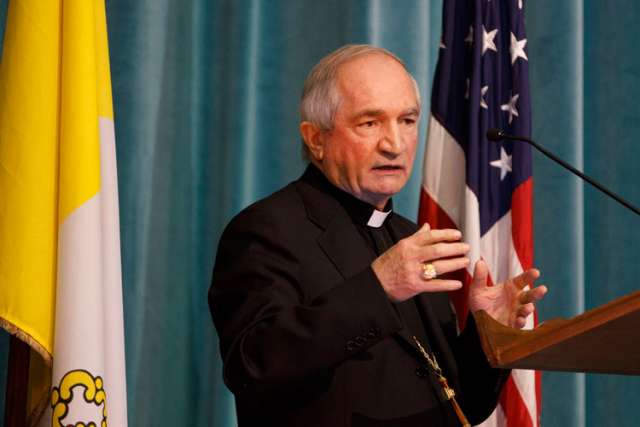Archbishop Silvano Tomasi, the Holy See representative to U.N. agencies in Geneva, told the Committee Against Torture May 6 that the sexual abuse of children "is a worldwide plague and scourge" that the Vatican, national bishops' conferences, religious orders and individual dioceses have worked seriously to eliminate within the Catholic Church.
While the archbishop mentioned "some divergence of opinion" about whether child sexual abuse legitimately falls under the concern of the U.N. Convention Against Torture and Other Cruel, Inhuman or Degrading Treatment, he answered the committee members' questions about Vatican efforts to investigate allegations against clergy, punish offenders and cooperate with civil authorities.
The Holy See signed the international treaty in 2002 and submitted its first report on adherence to the treaty in 2012. The committee met in Geneva in late April and in May to review the reports of the Holy See and seven other countries. The committee hearings were live-streamed on the Internet.
The committee members' questions to Archbishop Tomasi and the rest of the Vatican delegation May 5-6 focused on the handling of the abuse crisis, but also included challenges to the Holy See's affirmation that in fulfilling its treaty obligations, it has direct jurisdiction only over the territory of Vatican City State and not over bishops, priests or other Catholics outside the Vatican.
The archbishop told the committee, "It is one thing to be able to exercise jurisdiction and another to encourage a certain type of activity" or adoption of certain policies in Catholic communities around the globe.
Several members of the Committee Against Torture also raised questions about the Vatican's opposition to abortion in all cases. Felice Gaer, vice chair of the U.N. committee, told Archbishop Tomasi, "We've found people should have a legal right to choose where and how their choice would lead to less pain and suffering in cases of rape, incest, where the life of the mother is at risk and so forth."
Archbishop Tomasi responded, "We consider the right to life to be non-negotiable."
Through education and the provision of health care around the world, especially in the world's poorest communities, he said, the Catholic Church has done much to increase women's health, reduce maternal and infant deaths and offer material and spiritual support to pregnant women.
The Catholic Church, he said, "condemns torture, including for those who are tortured and killed before they are born."
On May 5, the committee had asked Archbishop Tomasi to provide statistics about cases of clerical sexual abuse reported to the Vatican and the outcome of those cases.
Between 2004 and 2013, he said May 6, the Congregation for the Doctrine of the Faith -- which is charged with investigating abuse claims against clergy -- received "credible accusations" against 3,420 priests. In the majority of cases, he said, the abuse was alleged to have occurred between 1950 and 1989. Many of those priests are or have been jailed by civil courts for their crimes, he said.
Between 2004 and 2013, he said, the Holy See dismissed 848 priests from the priesthood as a result of the allegations being found to be true. In another 2,572 cases -- mainly involving priests of an advanced age -- the men were ordered to have no contact with children and were ordered to retreat to a life of prayer and penance.
The Committee Against Torture has advocated for compensation to victims of torture, and members asked Archbishop Tomasi how much the Catholic Church has paid out to victims of clerical sexual abuse.
The Vatican does not have global figures, he said, but in the United States dioceses and religious orders have paid an estimated $2.5 billion to victims since 1950 and have spent another $78 million providing therapy and other support.
The committee asked specifically about Archbishop Jozef Wesolowski, the former nuncio to the Dominican Republic, whom the Vatican removed from his position in August after he was accused of paying for sex with boys in the Caribbean country.
Archbishop Tomasi said that the accusations against the nuncio, a Vatican citizen as all nuncios are, are the subject of a canonical investigation by the Congregation for the Doctrine of the Faith as well as a criminal investigation by the Vatican police and court.
The process has been slow, he said, because Vatican investigators are waiting for documentation from police in the Dominican Republic.
On the first day of the hearing, Archbishop Tomasi told the committee, "there has been in several documentable areas a stabilization and even a decline in cases" of abuse of minors. "Measures undertaken in the last 10 years on the part both of the Holy See and local churches are bringing about a positive result."
In his opening remarks to the committee, Archbishop Tomasi told members that the Holy See, which signed the anti-torture treaty, has no direct legal and juridical jurisdiction outside Vatican City State. While it hopes to exercise moral influence over all Catholics, "persons who live in a particular country are under the jurisdiction of the legitimate authorities of that country and are thus subject to the domestic law and the consequences contained therein."
Gaer, the vice chair, said she was concerned that while the Holy See voluntarily signed the treaty, it now claims it applies "only to the four corners of Vatican City State."
In the coming weeks, the Committee Against Torture will issue a written report of observations about the Vatican's adherence to the treaty and Archbishop Tomasi's response to committee members' questions.


